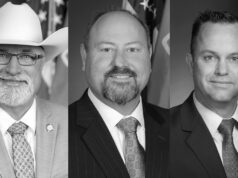When an Oklahoma legislative session winds down, it has been my experience that a great number of details get overlooked, misreported or confused.
Tracking legislative machinations at the end of session can be like handling the multi-ball bonus on a pinball machine. In the midst of all the hot action, it’s easy to lose a couple down the drain.
The reasons are understandable.
Tired journalists — staffers, legislators and lobbyists, too — are rushing to address hundreds of moving parts related to the general appropriations bill, budget-limitation bills and whatever high-profile policy initiatives are lingering around.
It’s not an easy time for anyone.
Still, I’ve always felt it was better for news organizations to emphasize accuracy over immediacy. Even in the final-week, chaotic crunchtime, the legislative process’s exact details still matter. In some ways, they matter more, especially for people newly engaged in the process.
But in the last week or so of Oklahoma’s 2016 session, we’re seeing a few instances when words and numbers are not being presented delicately enough.
Case in point: SCR 43
Friday, several news organizations ran with posts about Senate Current Resolution 43 by Sen. Anthony Sykes (R-Moore) and Rep. John Bennett (R-Sallisaw), two of the most conservative legislators in the state.
As if to double-down on those labels, the pair filled SCR 43 with language encouraging Oklahoma’s congressional delegation to file articles of impeachment against President Barack Obama.
Media immediately jumped on the effort as Big News.
While Reuters’ headline noted, “Some in Oklahoma statehouse urge Obama impeachment over bathroom rule,” KOCO Channel 5 was less specific.
“Oklahoma Legislature files measure asking Congress to impeach Obama,” their headline read.
It’s a minor difference in wording with major reactionary implications.
First, KOCO’s headline implies that the entire Legislature — or its leadership (or even a committee) — has moved to request the president’s impeachment. Lo’ and behold, with only 48 hours left in the 2016 session, SCR 43 has not received a hearing, nor has it been put on any agenda.
While Reuters’ headline was more nuanced, it still over-inflated the impact of Sykes and Bennett’s resolution by saying “some” lawmakers were urging impeachment even before co-authors were announced. Two extremists with a history of ignorant positions does not make “some,” in my mind. Perhaps they could have noted that only “13 of Oklahoma’s 149 legislators” ultimately co-authored the resolution? Better yet, they could have made it “8.7 percent of the statehouse” because Math.
Even worse, after Reuters and KOCO had published their posts, the OU Daily jumped on board by awkwardly posting three paragraphs about the impeachment request without naming SCR 43 or its authors. Their post attributes the resolution to the entire “Oklahoma legislature” as well, but opens with the phrase, “According to Reuters.” Reuters freelancer Heidi Brandes is listed in the OU Daily’s byline space, and the college paper’s second paragraph is lifted verbatim from the Reuters article, which is linked after paragraph three.
On Twitter, I alerted both the student paper and KOCO to these legislative-language nuances. Neither replied nor clarified the post, but outrage swirled on social media where 34,000 people have liked, commented on or shared the KOCO post on Facebook alone.
That’s good news for Sykes, who many suggest is seeking a run for Oklahoma’s attorney general in 2018. Whether the SCR is heard or not, the senator “earned” the type of aforementioned media that might help a fella in a Republican primary.
‘Crunchporting’ on legislative deadlines
With a state budget agreement announced and numbers finally available for crunching and reporting (crunchporting?) Tuesday, NewsOK’s Rick Green examined appropriation winners and losers.
Meanwhile, health reporter Jaclyn Cosgrove went long on proposed appropriations for the Oklahoma Department of Mental Health and Substance Abuse Services, which has already been scrambling to absorb $23 million in mid-year appropriation reductions.
Cosgrove has spent countless hours and inches chronicling Oklahoma’s mental health problems, putting faces on conditions that typically exist as vague, stigmatized concepts. Her work routinely graces The Oklahoman’s front page and emphasizes the need for important discussions about mental health care
But in this story about complex state budgeting, Cosgrove’s second paragraph erroneously specifies the agency’s appropriation problems, as noted by the Mental Health Association of Oklahoma:
Mike Brose, Mental Health Association Oklahoma CEO, said the Legislature recommendation, announced Tuesday, to appropriate only $7 million to the Oklahoma Department of Mental Health and Substance Abuse Services was not only a disappointment but also a failure in political leadership.
The article notes how the agency requested $30 million — or $23 million more — and it focuses on what mental health leaders say will be consequences of such lower state appropriations.
But those aren’t even remotely the agency’s actual appropriations for next year. While there is a $23 million difference between what the agency requested to stay flat and what the agency ultimately received, page 19 of the Legislature’s general appropriations bill directs more than $324 million to ODMHSAS, and the agency receives $102 million in other funding as well.
In other words, the agency is not seeking a 400 percent increase in its appropriations, as the article implies.
Down the gobble hole
In the light of day, ODMHSAS’s $23 million in FY reductions would likely have been avoided if the session’s controversial cigarette tax had passed. House Democrats played political chicken with the issue in a gutsy attempt to expand Medicaid, but they may ultimately eat crow for mental health cuts, if anyone’s paying attention. That’s another complex story for another time, though.
In all, these numbers and headlines (like ours here at NonDoc) come and go, passing through the internet atmosphere like a multi-ball bonus in a pinball game.
Sometimes, stories get wedged up in a pack of mushroom bumpers for a million points, but sometimes they fall in the gobble hole.
Ultimately, covering these topics is extremely hard, so we should all be prepared to take an extra roll of quarters to the arcade.
(Editor’s Note: William W. Savage III has been a credentialed Youth Mental Health First Aid instructor since 2013, and since 2016 he has contracted with ODMHSAS to provide the international suicide prevention and mental health awareness training to schools and businesses at no cost. He does not know what effect the agency’s budgeting may have on the program, nor does he seek to know it.)






















